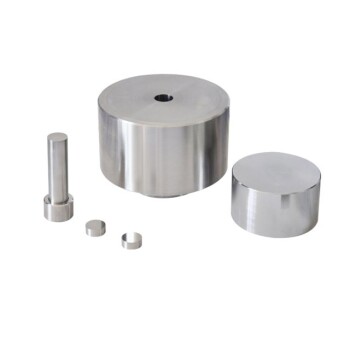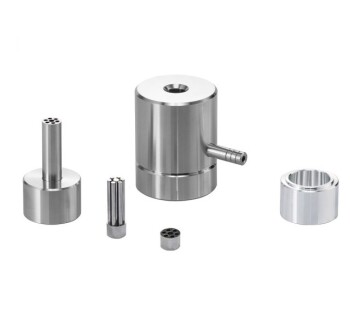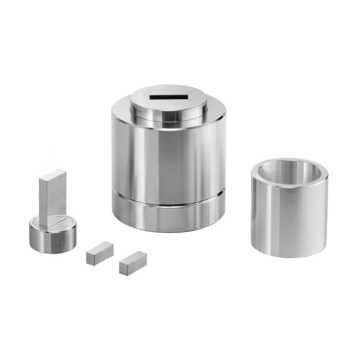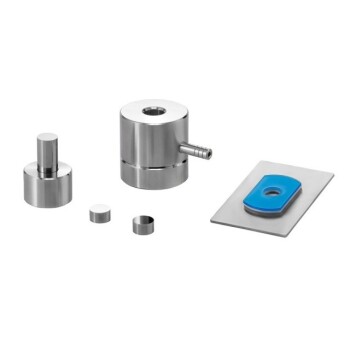In an industrial context, laboratory presses are fundamental tools that bridge the gap between research and full-scale production. They provide a controlled, small-scale environment to test materials, validate processes, and manufacture limited runs of components with a high degree of precision, making them indispensable for quality control, R&D, and lean manufacturing operations.
A laboratory press is more than a piece of testing equipment; it is a strategic asset that de-risks manufacturing processes. It allows companies to validate materials and methods efficiently before committing to the immense cost and time of a full production run.

The Core Functions in an Industrial Setting
A lab press performs several critical functions that support the broader goals of a manufacturing or research operation. Its value lies in its ability to apply precise force and, in many cases, heat, in a highly repeatable manner.
Material Testing and Analysis
A primary role is to test the physical properties of raw materials or finished composites. By subjecting a sample to a specific force, engineers can determine its compressive strength, flexibility, and durability under stress.
This function is vital for quality assurance (QA), ensuring that incoming materials meet the required specifications before entering the main production line.
Compacting and Sample Preparation
Presses are used to compact powders into solid pucks or pellets for further analysis, a process known as pelletizing. This is common in pharmaceuticals, ceramics, and material science.
They are also used to create uniform, void-free samples for spectroscopic or microscopic examination, ensuring that test results are accurate and representative of the material.
Molding and Prototyping
With heated platens, lab presses can be used for compression molding of polymers, composites, and other materials. This allows for the rapid creation of functional prototypes and test parts.
This capability is essential for R&D departments iterating on new designs and for lean manufacturing environments that require small, on-demand batches of specialized components.
How Lab Presses Drive Industrial Efficiency
Integrating a lab press into an industrial workflow is a strategic decision to improve speed, reduce waste, and enhance quality. It moves critical testing and validation steps "offline" from the main production machinery.
Accelerating Research and Development (R&D)
Using a lab press, researchers can quickly test new material formulations and molding parameters without interrupting large-scale production schedules. This dramatically shortens the development cycle for new products.
The ability to create small, accurate samples is far more cost-effective than using a production-scale machine for experimental runs, which would incur significant material waste and downtime.
Enabling Lean Manufacturing
For limited production runs or creating specialized parts, a lab press is an ideal tool. It aligns perfectly with lean principles by enabling just-in-time production of small batches, reducing the need for large inventories.
Its versatility means a single machine can be used for multiple tasks, from prototyping a new component to producing a small order for a client.
Ensuring Process and Quality Control
A lab press serves as the gold standard for process validation. Engineers can replicate the temperature and pressure of a large production press on a small scale to troubleshoot issues or optimize settings.
If a production line is yielding faulty parts, a lab press can be used to test the raw material and isolate the problem, preventing costly, large-scale failures.
Understanding the Trade-offs
While incredibly versatile, laboratory presses are specialized tools with specific limitations that must be understood to be used effectively.
Not a Substitute for Mass Production
The most significant limitation is scale. A lab press is designed for precision and repeatability in single or very small batch operations. It cannot replace the high-volume throughput of dedicated production machinery.
Requires Operational Expertise
Though often automated, achieving meaningful results requires a skilled operator. The user must understand material science, experimental design, and how to interpret the output to make informed decisions. The press is a tool; the expertise lies with the user.
Investment vs. Application
A high-quality industrial lab press represents a significant capital investment. Its cost must be justified by its role in high-value activities like R&D, process optimization, or critical quality assurance, not as a general-purpose shop tool.
Making the Right Choice for Your Goal
The value of a laboratory press is directly tied to your specific operational objective.
- If your primary focus is R&D and Material Science: The press is your platform for rapid innovation, allowing you to test new formulations and concepts quickly and affordably.
- If your primary focus is Quality Assurance: Use the press as a gatekeeper to validate incoming materials and troubleshoot production issues before they impact the entire line.
- If your primary focus is Lean Production or Prototyping: Leverage the press to create high-fidelity prototypes and small, on-demand component batches without the waste of a full production setup.
Ultimately, a laboratory press is a powerful instrument of control, enabling you to bring certainty and precision to your most critical industrial processes.
Summary Table:
| Function | Key Benefits |
|---|---|
| Material Testing | Ensures quality assurance and validates material properties |
| Compacting/Sample Prep | Creates uniform samples for accurate analysis |
| Molding/Prototyping | Enables rapid prototyping and small-batch production |
| R&D Acceleration | Speeds up innovation cycles and reduces development costs |
| Lean Manufacturing | Supports just-in-time production and reduces waste |
| Process Control | Troubleshoots and optimizes manufacturing processes |
Ready to elevate your laboratory's capabilities with precision lab presses? KINTEK specializes in automatic lab presses, isostatic presses, heated lab presses, and more, designed to meet your R&D, quality control, and prototyping needs. Contact us today to learn how our solutions can boost your efficiency and reduce costs—get in touch now!
Visual Guide

Related Products
- Laboratory Hydraulic Press 2T Lab Pellet Press for KBR FTIR
- Manual Heated Hydraulic Lab Press with Integrated Hot Plates Hydraulic Press Machine
- Lab Anti-Cracking Press Mold
- Automatic Laboratory Hydraulic Press Lab Pellet Press Machine
- Laboratory Hydraulic Split Electric Lab Pellet Press
People Also Ask
- How do hydraulic press machines ensure precision and consistency in pressure application? Achieve Reliable Force Control for Your Lab
- How are hydraulic presses used in spectroscopy and compositional determination? Enhance Accuracy in FTIR and XRF Analysis
- What is the role of a hydraulic press in KBr pellet preparation for FTIR? Achieve High-Resolution Chemical Insights
- Why must a laboratory hydraulic press be used for pelletizing samples for FTIR? Achieve Precision in Spectral Data
- What are some laboratory applications of hydraulic presses? Boost Precision in Sample Prep and Testing



















